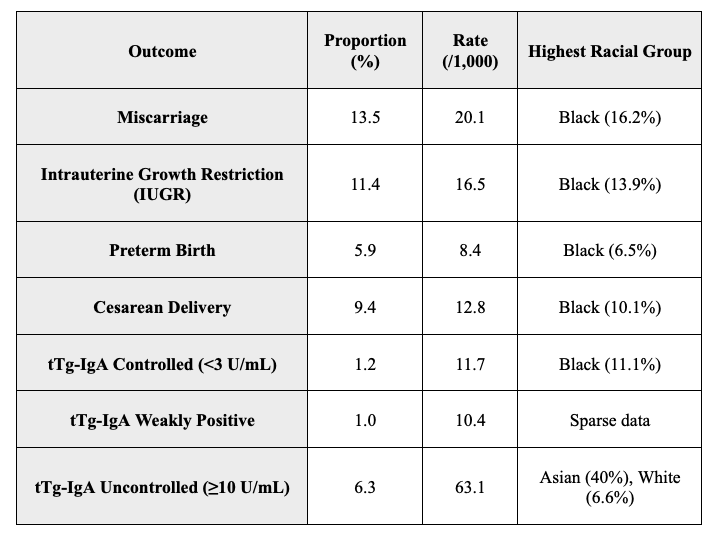Monday Poster Session
Category: Small Intestine
P4052 - Incidence of Adverse Pregnancy Outcomes and Tissue Transglutaminase IgA Activity in Women With Celiac Disease: A 10-Year Multicenter Cohort Study Using TriNetX
Monday, October 27, 2025
10:30 AM - 4:00 PM PDT
Location: Exhibit Hall

Archana Kharel, MD (she/her/hers)
Cleveland Clinic
Cleveland, OH
Presenting Author(s)
Archana Kharel, MD1, Andrew Ford, MD2, Arjun Chatterjee, MD3, Prabhat Kumar, MD4, Gengqing Song, MD, PhD5, Alberto Rubio Tapia, MD3
1Cleveland Clinic, Cleveland, OH; 2Case Western Reserve University / MetroHealth, Cleveland, OH; 3Cleveland Clinic Foundation, Cleveland, OH; 4Virginia Commonwealth University, Richmond, VA; 5Case Western Reserve University/Metro Health, Cleveland, OH
Introduction: Celiac disease (CeD) is an immune-mediated enteropathy increasingly recognized in women of reproductive age and has been implicated in poor pregnancy outcomes. However, large-scale data in the United States remain limited, particularly regarding the role of serologic disease control. We aimed to evaluate the national burden of adverse pregnancy outcomes in women with CeD and assess the association with serum tissue transglutaminase IgA (tTg-IgA) levels as a proxy for disease activity.
Methods: We queried the TriNetX Research Network (102 U.S. health systems) for pregnancies among women aged 18–45 years with a prior ICD-10 diagnosis of CeD (K90.0) recorded ≥280 days before a delivery-related encounter (O80–O84, Z37.*) from May 1, 2015, to May 1, 2025. Exclusion criteria included systemic lupus, Crohn’s disease, uterine anomalies, chronic renal or heart failure, substance use, or other malabsorptive conditions. Outcomes included miscarriage, intrauterine growth restriction (IUGR), preterm birth (< 37 weeks), and cesarean delivery and the most recent tTg-IgA during pregnancy was categorized as: controlled (< 3 U/mL), weakly positive (4–9 U/mL), or uncontrolled (≥10 U/mL).
Results: Among 2,161 CeD pregnancies (median age 29 y; 72% White, 11% Black, 9% Hispanic), the overall incidence proportions were: miscarriage 13.5%, IUGR 11.4%, preterm birth 5.9%, and cesarean delivery 9.4%. Women aged 35–39 had the highest complication burden. Adverse outcomes were disproportionately higher in Black and Hispanic women. Of 183 pregnancies with tTg-IgA data, only 1.2% were serologically controlled, while 6.3% were uncontrolled. Most complications clustered in the uncontrolled group.
Discussion: In this national cohort, adverse pregnancy outcomes were frequent in women with CeD, particularly among those ≥35 years and with elevated tTg-IgA levels. Serologic remission was uncommon. These findings highlight the importance of preconception CeD optimization, including strict gluten-free diet adherence, nutritional counseling, and periodic tTg-IgA monitoring to mitigate pregnancy risk and address racial disparities.

Figure: Table: Adverse Pregnancy Outcomes and Serologic Activity in Women with CeD
Disclosures:
Archana Kharel indicated no relevant financial relationships.
Andrew Ford indicated no relevant financial relationships.
Arjun Chatterjee indicated no relevant financial relationships.
Prabhat Kumar indicated no relevant financial relationships.
Gengqing Song indicated no relevant financial relationships.
Alberto Rubio Tapia indicated no relevant financial relationships.
Archana Kharel, MD1, Andrew Ford, MD2, Arjun Chatterjee, MD3, Prabhat Kumar, MD4, Gengqing Song, MD, PhD5, Alberto Rubio Tapia, MD3. P4052 - Incidence of Adverse Pregnancy Outcomes and Tissue Transglutaminase IgA Activity in Women With Celiac Disease: A 10-Year Multicenter Cohort Study Using TriNetX, ACG 2025 Annual Scientific Meeting Abstracts. Phoenix, AZ: American College of Gastroenterology.
1Cleveland Clinic, Cleveland, OH; 2Case Western Reserve University / MetroHealth, Cleveland, OH; 3Cleveland Clinic Foundation, Cleveland, OH; 4Virginia Commonwealth University, Richmond, VA; 5Case Western Reserve University/Metro Health, Cleveland, OH
Introduction: Celiac disease (CeD) is an immune-mediated enteropathy increasingly recognized in women of reproductive age and has been implicated in poor pregnancy outcomes. However, large-scale data in the United States remain limited, particularly regarding the role of serologic disease control. We aimed to evaluate the national burden of adverse pregnancy outcomes in women with CeD and assess the association with serum tissue transglutaminase IgA (tTg-IgA) levels as a proxy for disease activity.
Methods: We queried the TriNetX Research Network (102 U.S. health systems) for pregnancies among women aged 18–45 years with a prior ICD-10 diagnosis of CeD (K90.0) recorded ≥280 days before a delivery-related encounter (O80–O84, Z37.*) from May 1, 2015, to May 1, 2025. Exclusion criteria included systemic lupus, Crohn’s disease, uterine anomalies, chronic renal or heart failure, substance use, or other malabsorptive conditions. Outcomes included miscarriage, intrauterine growth restriction (IUGR), preterm birth (< 37 weeks), and cesarean delivery and the most recent tTg-IgA during pregnancy was categorized as: controlled (< 3 U/mL), weakly positive (4–9 U/mL), or uncontrolled (≥10 U/mL).
Results: Among 2,161 CeD pregnancies (median age 29 y; 72% White, 11% Black, 9% Hispanic), the overall incidence proportions were: miscarriage 13.5%, IUGR 11.4%, preterm birth 5.9%, and cesarean delivery 9.4%. Women aged 35–39 had the highest complication burden. Adverse outcomes were disproportionately higher in Black and Hispanic women. Of 183 pregnancies with tTg-IgA data, only 1.2% were serologically controlled, while 6.3% were uncontrolled. Most complications clustered in the uncontrolled group.
Discussion: In this national cohort, adverse pregnancy outcomes were frequent in women with CeD, particularly among those ≥35 years and with elevated tTg-IgA levels. Serologic remission was uncommon. These findings highlight the importance of preconception CeD optimization, including strict gluten-free diet adherence, nutritional counseling, and periodic tTg-IgA monitoring to mitigate pregnancy risk and address racial disparities.

Figure: Table: Adverse Pregnancy Outcomes and Serologic Activity in Women with CeD
Disclosures:
Archana Kharel indicated no relevant financial relationships.
Andrew Ford indicated no relevant financial relationships.
Arjun Chatterjee indicated no relevant financial relationships.
Prabhat Kumar indicated no relevant financial relationships.
Gengqing Song indicated no relevant financial relationships.
Alberto Rubio Tapia indicated no relevant financial relationships.
Archana Kharel, MD1, Andrew Ford, MD2, Arjun Chatterjee, MD3, Prabhat Kumar, MD4, Gengqing Song, MD, PhD5, Alberto Rubio Tapia, MD3. P4052 - Incidence of Adverse Pregnancy Outcomes and Tissue Transglutaminase IgA Activity in Women With Celiac Disease: A 10-Year Multicenter Cohort Study Using TriNetX, ACG 2025 Annual Scientific Meeting Abstracts. Phoenix, AZ: American College of Gastroenterology.
